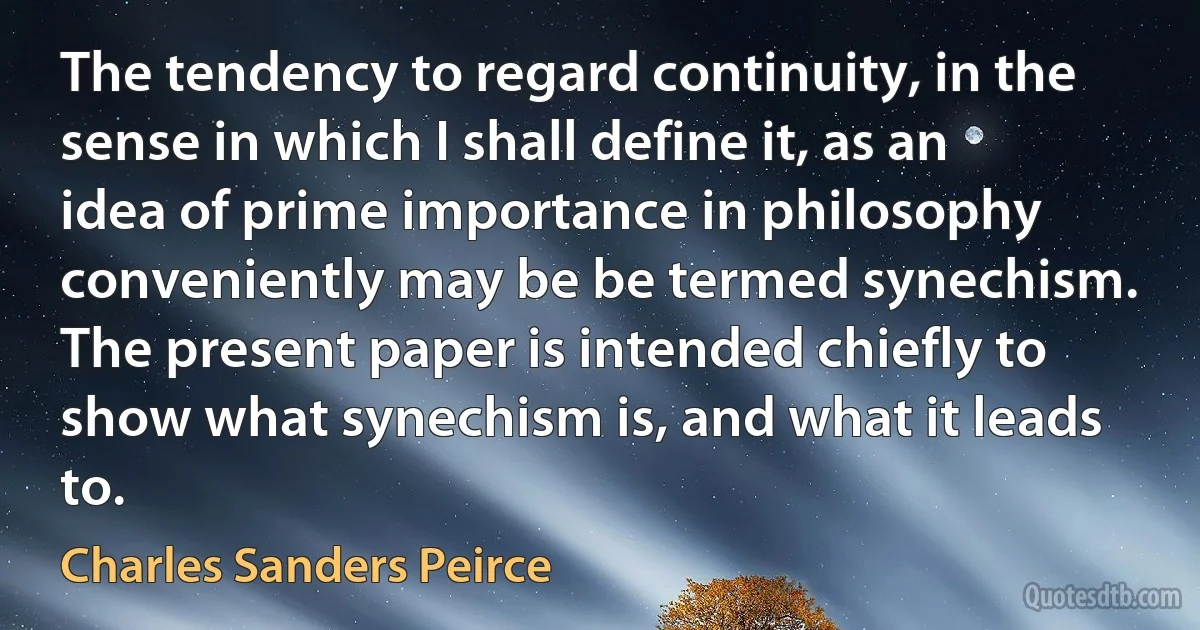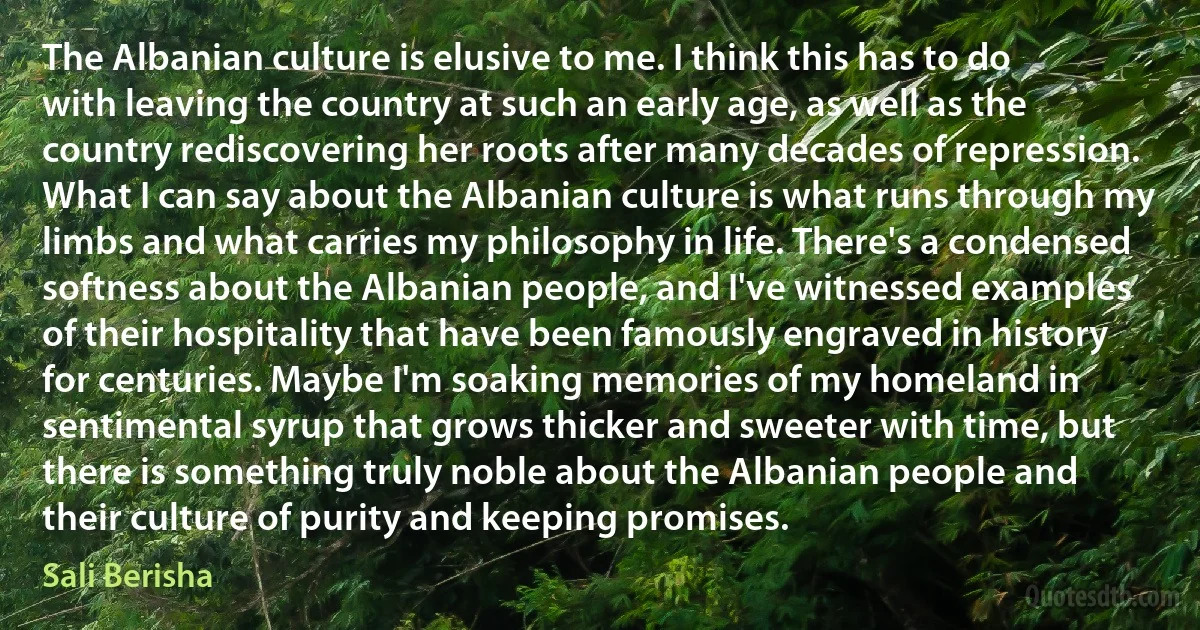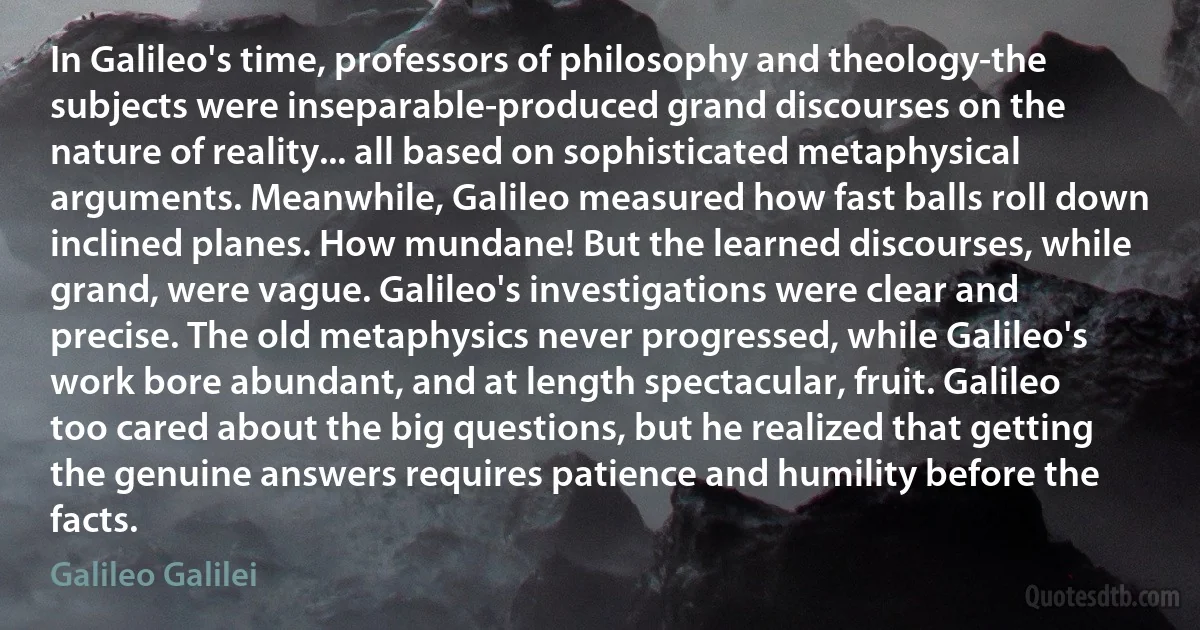Philosophy Quotes - page 99
Om or Aum (Sk.). A mystic syllable, the most solemn of all words in India. It is "an invocation, a benediction, an affirmation and a promise and it is so sacred, as to be indeed the word at low breath of occult, primitive masonry. No one must be near when the syllable is pronounced for a purpose. This word is usually placed at the beginning of sacred Scriptures, and is prefixed to prayers. It is a compound of three letters a,u,m, which, in the popular belief, are typical of the three Vedas, also of three gods-A (Agni) V (Varuna) and M (Maruts) or Fire, Water and Air. In esoteric philosophy these are the three sacred fires, or the "triple fire”in the Universe and Man, besides many other things...

Helena Petrovna Blavatsky
The Persian ruler Nadir Shah, in his invasion of India in 1738, killed some 200,000 people and returned with a huge quantity of booty and a large number of slaves, including a few thousand beautiful girls. Alain Danielou (d. 1994), French scholar of Indian philosophy, religion, history and arts, described Nadir Shah's assault of Delhi as follows: ‘...for a week his soldiers massacred everybody, ransacked everything, and razed the entire countryside, so that the survivors would have nothing to eat. He went back to Iran taking with him precious furniture, works of art, horses, the Kohinoor diamond, the famous Peacock throne, and 150 million rupees in gold.'

Nader Shah
The object of Dr Hutton was not, like that of most other theorists, to explain the first origin of things. He was too well skilled in the rules of sound philosophy for such an attempt; and he accordingly confined his speculations to those changes which terrestrial bodies have undergone since the establishment of the present order, in as far as distinct marks of such changes are now to be discovered.

James Hutton
The formal character of a living literature is the same as its inner character: it denies verities; it denies what everyone knows and what I have known until this moment. It departs from the canonical tracks, from the broad highway. ... To literature today the plane surface of daily life is what the earth is to an airplane - a mere runway from which to take off, in order to rise aloft, from daily life to the realities of being, to philosophy, to the fantastic. Let yesterday's cart creak along the well-paved highways. The living have strength enough to cut away their yesterday.

Yevgeny Zamyatin
There was then no professorship in mathematics and no opening for a mathematician to a career at Cambridge; and so Wallis reluctantly left the university. In 1649 he was appointed to the Savilian chair of geometry at Oxford, where he lived until his death on Oct. 28, 1703. It was there that all his mathematical works were published. Besides those he wrote on theology, logic, and philosophy; and was the first to devise a system for teaching deaf mutes.

John Wallis
The kind of equality utilitarianism supports is given by Bentham's formula...: ‘everybody to count for one, and nobody for more than one'...Utilitarianism seeks to maximize happiness, and in deciding how to calculate whether happiness is being maximized, no one's pleasures or pains should count for less because they are peasants rather than aristocrats, slaves rather than slave-owners, Africans rather than Europeans, poor rather than rich, illiterates rather than doctors of philosophy, children rather than adults, females rather than males, or even, as we have seen, non-human animals rather than human beings.

Peter Singer
If reason is both transcendent and immanent, then philosophy, as culture-bound reflection and argument about eternal questions, is both in time and eternity. We don't have an Archimedean point; we always speak the language of a time and place; but the rightness and wrongness of what we say is not just for a time and a place.

Hilary Putnam
Now, moral philosophers generally prefer to talk about virtues, or about (specific) duties, rights, and so on, rather than about moral images of the world. There are obvious reasons for this; nevertheless, I think that it is a mistake, and that Kant is profoundly right. What we require in moral philosophy is, first and foremost, a moral image of the world, or rather--since, here again, I am more of a pluralist than Kant--a number of complementary moral images of the world.

Hilary Putnam
They have founded the whole structure of their happiness on these very illusions, which ought to be combated and dissipated by the light of knowledge, and they would think they were paying too dearly for a truth which begins by robbing them of all that has value in their sight. It would be necessary that they should be already sages to love wisdom: a truth that was felt at once by him to whom philosophy owes its name.

Friedrich Schiller
For our chronically and extremely hungry man, Utopia can be defined simply as a place where there is plenty of food. He tends to think that, if only he is guaranteed food for the rest of his life, he will be perfectly happy and will never want anything more. Life itself tends to be defined in terms of eating. Freedom, love, community feeling, respect, philosophy, may all be waved aside as fripperies that are useless since they fail to fill the stomach. Such a man may fairly be said to live by bread alone. It cannot possibly be denied that such things are true, but their generality can be denied. Emergency conditions are, almost by definition, rare in the normally functioning peaceful society.

Abraham Maslow
Well, what kind of thing does make you feel calm and peaceful?"
"Killing demons. A good clean kill is very relaxing. The messy ones are more annoying, because you have to clean up afterward--"
"No. No killing. We're trying to make you feel peaceful. Blood, killing, war, those are all non-peaceful things. Isn't there anything else you like?"
"Weapons. I like weapons."
"I'm starting to think we have a problematic issue of personal philosophy here.

Cassandra Clare
«She is able to oscillate between classical allusions to the holy books and the works of great poets like Hölderlin, Baudelaire, Borges, Artaud and Celan, and then she comes to terms with the Beat Generation, with Ferlinghetti, Corso, with the philosophy of the existentialists. With immediate acceptances, repulses, with vast ignitions and immense fires, with echoes of jazz and pop music» (Dante Maffia about Fatti deprecabili/Deprecable Facts)

Caterina Davinio
Now they had to study just as stringently and methodically as the engineers and technicians of the past, if not more so. They had a steep path to climb, had to purify and strengthen their minds by dint of mathematics and scholastic exercises in Aristotelian philosophy. Moreover, they had to learn to renounce all those benefits which previous generations of scholars had considered worth striving for: rapid and easy money-making, celebrity and public honors, the homage of the newspapers, marriages with daughters of bankers and industrialists, a pampered and luxurious style of life.

Hermann Hesse
As Voltaire once remarked, "It is the privilege of the real genius, especially one who opens up a new path, to make great mistakes with impunity." The Copernican revolution brought about by Kant was, I think, the most important single turning point in the history of philosophy. For that reason there has been, ever since, a watershed in understanding between those who have taken his work on board and those who have not. For a good many of the problems he uncovered, the solutions he put forward have not stood the test of time, but his uncovering of the problems remains the most illuminating thing a philosopher has ever done. Because of the fundamental character of these problems, and because Kant did not solve them, confronting them has been the most important challenge to philosophy ever since.

Bryan Magee
The shrewd, calculating commercialism which tries all human relations by pecuniary standards, the acquisitiveness which cannot rest while there are competitors to be conquered or profits to be won, the love of social power and hunger for economic gain-these irrepressible appetites had evoked from time immemorial the warnings and denunciations of saints and sages. Plunged in the cleansing waters of later Puritanism, the qualities which less enlightened ages had denounced as social vices emerged as economic virtues. They emerged as moral virtues as well. For the world exists not to be enjoyed, but to be conquered. Only its conqueror deserves the name of Christian. For such a philosophy, the question, "What shall it profit a man?" carries no sting. In winning the world, he wins the salvation of his own soul as well.

R. H. Tawney
My individualism was a logical extension of the anarchist principle beyond its narrow application to one particular form or mode of constraint upon the individual. The thing that interested me, as it interested Emerson and Whitman, was a general philosophy of life which regards human personality as the greatest and most respect-worthy object in the world, and as a complete end-in-itself; a philosophy, therefore, which disallows its subversion or submergence, whether by force of law or by any other coercive force. I was convinced that human beings do better and are happier when they have the largest possible margin of existence to regulate and dispose of as they please; and hence I believed that society should so manage itself as to leave the individual a maximum of free choice and action, even at a considerable risk of results which from the short-time point of view would be pronounced dangerous.

Albert Jay Nock
Revolution is not something fixed in ideology, nor is it something fashioned to a particular decade. It is a perpetual process embedded in the human spirit. When all today's isms have become yesterday's ancient philosophy, there will still be reactionaries and there will still be revolutionaries. No amount of rationalization can avoid the moment of choice each of us brings to our situation here on the planet. I still believe in the fundamental injustice of the profit system and do not accept the proposition there will be rich and poor for all eternity.

Abbie Hoffman
Final causes or intentions are the torment of modern philosophy, which neglects nothing to get rid of them. From this, among other things, comes its great axiom: nature creates only individuals. Indeed, since all classification supposes order, this philosophy has denied classes to deny order. In order to establish this marvellous reasoning, it fixes its suspicious eyes on the differences between beings to dispense itself from turning them to their similarities. It does not want to recognize that nuances between classes and individuals constitute another order, and that diversity in resemblance supposes intention more visibly than mere resemblance.

Joseph de Maistre
There is no phenomenon in the universe that does not intimately concern us, from a pebble resting at the bottom of the ocean, to the movement of a galaxy millions of light years away. Walt Whitman said, "I believe a blade of grass is no less than the journey-work of the stars...." These words are not philosophy. They come from the depths of his soul. He also said, "I am large, I contain multitudes." This might be called a meditation on "interfacing endlessly interwoven." All phenomena are interdependent. When we think of a speck of dust, a flower, or a human being, our thinking cannot break loose from the idea of unity, of one, of calculation. We see a line drawn between one and many, one and not one. But if we truly realize the interdependent nature of the dust, the flower, and the human being, we see that unity cannot exist without diversity. Unity and diversity interpenetrate each other freely. Unity is diversity, and diversity is unity. This is the principle of interbeing.

Nhat Hanh
The broader ontology typically associated with atheism is naturalism-there is only one world, the natural world, exhibiting patterns we call the "laws of nature,” and which is discoverable by the methods of science and empirical investigation. There is no separate realm of the supernatural, spiritual, or divine; nor is there any cosmic teleology or transcendent purpose inherent in the nature of the universe or in human life. "Life” and "consciousness” do not denote essences distinct from matter; they are ways of talking about phenomena that emerge from the interplay of extraordinarily complex systems. Purpose and meaning in life arise through fundamentally human acts of creation, rather than being derived from anything outside ourselves. Naturalism is a philosophy of unity and patterns, describing all of reality as a seamless web.

Sean M. Carroll



